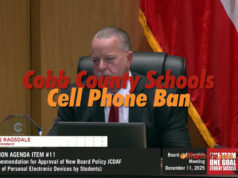Despite celebrating its 20th year of facilitating philanthropy, the Cobb Community Foundation (CCF) remains largely unknown to many Cobb residents. That’s changing, however, as CCF implements a strategy to enhance its visibility and triple assets in three years.
The Foundation started in 1993 when a “who’s who” of Cobb County—a group including the likes of Sen. Johnny Isakson and the late Marietta Daily Journal publisher Otis A. Brumby Jr.— “decided we needed a community foundation in Cobb,” explains CCF Founding Chair James L. Rhoden, Jr., principal owner of Futren Corporation.
The idea was to establish a philanthropic organization with non-profit 501(c)(3) status through which individuals, families, organizations and corporations could support charitable causes in Cobb County, such as education, the arts, health and historical, cultural and environmental resources.
Professionals would manage assets and a board of local citizens would oversee administration. Meanwhile, donors to the Cobb Community Foundation—one of 13 community foundations in Georgia today—could support projects they cared about and benefit from a maximum tax advantage and a higher deduction than allowed if the same gift amount was placed in a private foundation. For example, a donor could start for a minimum $5,000 investment—less than typically required by other community foundations, and substantially less than what would be required to establish a private foundation. Over time, these investments have grown to benefit the entire Cobb community.
Increasing Visibility, Assets
Initially, CCF was an affiliate of The Community Foundation for Greater Atlanta. Established in 1951, it is the oldest of Georgia’s community foundations and, in terms of assets, by far the largest with more than $700 million in 2010.
Rhoden says that several issues, including a $50,000 fund minimum, brought about the transfer of CCF to the Community Foundation for Northeast Georgia (CFNG), where the assets slowly grew. Ultimately, Rhoden says, Cobb fund leaders thought they could manage the fund for less. In 2007, CCF gained tax-exempt status from the Internal Revenue Service and became a separate legal entity, although CFNG provided “back-office” administration until 2009.
In 2007, CCF had assets of about $2.4 million and ranked 12th of the 13 Georgia community foundations in terms of assets, according to a Georgia State University report. But, despite the recession, CCF’s assets have more than doubled since 2007 and stand today at about $5 million. About 60 percent of the growth has happened in the past 18 months, says CCF Board Chair David S. Fisher, a CPA and founding partner of Signature FD, LLC, a wealth management firm.
A partnership with the Cobb Chamber of Commerce, a strategic planning effort, and a new executive have helped stimulate recent growth. Going forward, Fisher says CCF has several three-year goals: building visibility; growing the board from the current 23 active members to as many as 30; and tripling assets from about $5 million to between $15 million and $17 million in three years.
That asset level represents financial sustainability for CCF, says Fisher. “For CCF, the majority of our fees need to come and should come from the (1.25 percent) administrative charges that we earn from the accounts that we manage,” he adds. “Our job is to safely hold and invest capital and report on that. As we grow and have larger expenses, we have to grow that part of the budget.”
Coming Together
The CCF-Chamber partnership started to take shape in 2011, says Rick Hamilton, CCF’s chair in 2012 and a CPA with HLB Gross Collins, PC, adding that most members of the CCF board were also active Cobb Chamber members. In late 2011 they proposed to Cobb Chamber President and CEO David Connell that CCF be housed at the Chamber’s headquarters at 240 Interstate North Parkway.
Connell and the Chamber agreed and, Hamilton says, “very graciously agreed to have CCF, provide signage and space and help with administrative work. It gave us access to meeting rooms, a boardroom and technology. It has been fantastic for us.”
Moving to the Chamber in the summer of 2012 also helped CCF’s visibility, Hamilton says. “It is a great relationship for us. The Chamber’s management is looking out for us and helping to get the CCF story out … in the last year we have come a long, long way.”
“Getting the story out” was a take-away of research done at about the same time by consultant Coxe Curry & Associates. “We learned that CCF was not very well known,” Hamilton says. “People did not know what the foundation is there for, what the mission is. That was a catalyst for some of the things we’ve been doing.”
The most significant, Hamilton says, was the hiring in March 2012 of an “outward-facing” executive director: Acworth Mayor Tommy Allegood. “That is the critical change that had the most impact,” says Hamilton. “It all came together. With Tommy housed at the Chamber, things began to fall in place. In the upper levels of Cobb’s business community, people get it now.” Current chair Fisher concurs. “The relationship with the Chamber is beneficial,” he says. “It has given us management and administrative support and allows Tommy to focus on other important parts of the job.”
Most important is “enhancing the visibility of the organization,” says Fisher, who gives Allegood high marks for connecting leaders of charities, businesses and other communities in Cobb County. “We think about it as being in the middle of the charitable ecosystem … the non-profit community and individual donors who have the financial capacity to fill their needs,” he says.
Allegood is quick to point out that the Chamber, while very important, is one of about 100 “Partners in Philanthropy” that also provide support for CCF with in-kind gifts and financial assistance. “A lot of our growth has to do with being out and telling our story in the community,” says Allegood. “People realize what a great advantage CCF is.”
Making Philanthropy Easy
There are currently 55 different funds and foundations in CCF. Among the better-known are the MUST Ministries Foundation Fund; Acworth Special Needs Development Fund; East, North and South Cobb Rotary Funds; Marietta and Metro Kiwanis Scholarship Funds; Cobb Landmarks & Historical Society; Humane Society of Cobb County Foundation Fund; United Arts of Cobb Fund; and the WellStar Angel Fund. Funds are managed by Atlanta-based asset management firm Wela Strategies.
While CCF offers many types of funds, Fisher explains they basically fall into one of two groups. The first is agency funds. These include money from non-profits who hire CCF to manage their assets. The second is donor-advised funds in which a donor—typically a family—wants to be actively engaged in giving.
While agency funds remain important, Fisher says CCF anticipates greater future asset growth in donor-advised family funds, “specifically families who take a long-term view and a family generational view. That’s where CCF excels.” A person in the high-income-earning years, or selling a family business or real estate faces a large tax impact, Fisher says. But those situations are perfect opportunities to use a community foundation to start a fund, reduce taxes and in later years choose what cause to support. “A family can always set up private foundation but there are significant costs involved,” says Fisher. “For a relatively modest cost (1.25 percent of assets), we run administration. You get the benefits of family foundation for a fraction of the cost.”
Moreover, Fisher adds, a rule of thumb is that unless a donor can put a minimum of $500,000 or more into a private foundation—the primary alternative to a community foundation—“it doesn’t make sense from a cost perspective.” Establishing a private foundation typically requires paying for the services of an attorney, a CPA or tax preparer and someone to manage assets, he says.
“We are unique in that lower ($5,000) minimum,” Fisher says. “Many community foundations have $25,000 or $50,000 minimum. We believe in making it easy for people to begin working with us. If a family wants the benefits of a private foundation, then a community foundation becomes the solution.”
As it has for the past 20 years, the CCF will continue its quiet philanthropic work in the Cobb community, and encourages more citizens to enjoy the benefits it has to offer.















